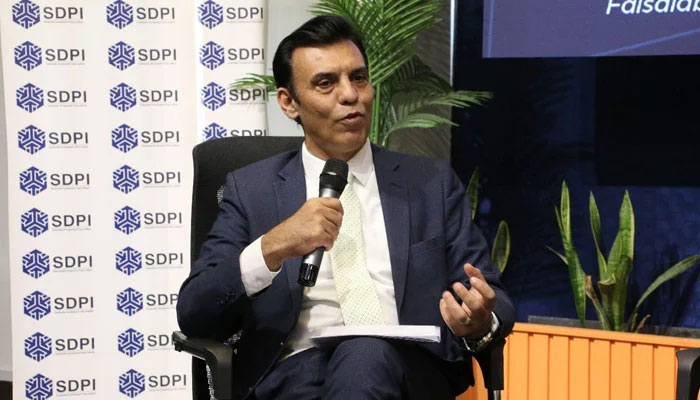‘Transparency and accountability crucial to end capacity payments’
Islamabad:Dr Abid Qaiyum Suleri, Executive Director, Sustainable Development Policy Institute (SDPI), has said that renegotiation of agreements with the independent power producers (IPPs) based on principles of transparency and accountability is crucial to end increasing burned of capacity payments on the masses.
Dr Suleri was having a chat at SDPI’s own TV network here Wednesday. The SDPI chief provided a clear way forward to address the power sector crisis leading to increased tariffs hurting the common masses’ incomes. He said the IPPs were introduced as panacea in the beginning during the 15-16 hours electricity loadshedding occurring in the past and were promoted as a remedy to make up that shortfall.
He noted that during the process of establishing IPPs, there were flaws in the policies that promoted prevailing elite capture, whereas proper procedures, due diligence and Competition Commission of Pakistan (CCP) rules needs to be followed in the renewal process of IPPs licenses and agreements.
Capacity payment, he said, was like any resource hired for services and left unused but the lender was charging for that resource even if it was kept idle. The process for hiring those services needs to be discussed as the resources employed without assessing its compatibility, capacity and efficiency brings the onus on the decision-making quarters for the failure. The flawed policies made by the government of Pakistan were exploited by IPPs, he said.
Many of the agreements with the IPPs have sovereign guarantees awarded to the IPPs, whereas in case of abrupt abolishment of those agreements, there would be court of arbitration or grievance redressal mechanisms coming into force causing further damage to the government, he added.
Dr Suleri suggested that the way forward is to introduce tariff rationalisation, more usage of electricity in the system, local IPPs irrespective of ownership will have to be brought on table to renegotiate tenor and capacity payment charges, terms and conditions along with abolishment of dollar denominated returns and back door diplomacy for the Chinese IPPs under CPEC.
“Chinese never favour their partner countries with publicity. The Chinese have hundreds of investments under BRI in numerous countries and if they will do drumbeating on it then other countries will demand the same from them,” he said. During previous PTI regime, he said, the Chinese government suggested the Pakistani government to negotiate with its local IPPs and in case tenure and tenor are successfully renegotiated with them then the Chinese would implement the same on their IPPs.
“The Finance Minister is in Beijing and the Chinese will ask him to negotiate with the local IPPs first and then the same terms and condition will be implemented on their IPPs. Chinese will accept all those conditions but will favour Pakistan discreetly and will not come under any pressure,” Dr Suleri said.
He recommended that the domestic players need to be taken on board and all had to play their role as the Special Investment Facilitation Council (SIFC) had to take up the matter productively and negotiate with the IPPs to end up their unjust agreements devouring billions of rupees of national exchequer and allow the country to grow. He further suggested that the fossil fuel dependent IPPs needs to be retired and replaced with renewable energy projects to reduce their environmental impact and cost as well.
-
 AI Innovation Could Make Trade Secrets More Valuable Than Patents, Says Billionaire Investor
AI Innovation Could Make Trade Secrets More Valuable Than Patents, Says Billionaire Investor -
 King Charles Heckling: Calls For 10 BAFTAs And A Knighthood For Sign Language Interpreter
King Charles Heckling: Calls For 10 BAFTAs And A Knighthood For Sign Language Interpreter -
 Kim Kardashian Leaves Meghan Markle 'upset' With Latest 'cheap Shot'
Kim Kardashian Leaves Meghan Markle 'upset' With Latest 'cheap Shot' -
 Royal Expert On Andrew, Sarah Ferguson’s ‘entitled’ Behaviour Since Marriage
Royal Expert On Andrew, Sarah Ferguson’s ‘entitled’ Behaviour Since Marriage -
 Instagram And YouTube Accused Of Engineering Addiction In Children’s Brains
Instagram And YouTube Accused Of Engineering Addiction In Children’s Brains -
 Trump Reached Out To Police Chief Investigating Epstein In 2006, Records Show
Trump Reached Out To Police Chief Investigating Epstein In 2006, Records Show -
 Keke Palmer Praises Actor Who Inspired 'The Burbs' Role
Keke Palmer Praises Actor Who Inspired 'The Burbs' Role -
 Humans May Have 33 Senses, Not 5: New Study Challenges Long-held Science
Humans May Have 33 Senses, Not 5: New Study Challenges Long-held Science -
 Kim Kardashian Prepared To Have Child With Lewis Hamilton: 'Baby Using A Surrogate'
Kim Kardashian Prepared To Have Child With Lewis Hamilton: 'Baby Using A Surrogate' -
 Internet Splits Over New York's Toilet Data Amid Bad Bunny's Super Bowl Show
Internet Splits Over New York's Toilet Data Amid Bad Bunny's Super Bowl Show -
 Prince William Inspects Saudi Arabia's Efforts To Promote Football In Young Girls
Prince William Inspects Saudi Arabia's Efforts To Promote Football In Young Girls -
 Northern Lights: Calm Conditions Persist Amid Low Space Weather Activity
Northern Lights: Calm Conditions Persist Amid Low Space Weather Activity -
 'Look What Andrew Has Done': Meghan Markle Defended On Jeremy Vine Show
'Look What Andrew Has Done': Meghan Markle Defended On Jeremy Vine Show -
 Apple, Google Agree To Make 'app Store' Changes Over UK Regulator Concerns
Apple, Google Agree To Make 'app Store' Changes Over UK Regulator Concerns -
 Autodesk Files Lawsuit Against Google Over AI Video Tool Trademark Dispute
Autodesk Files Lawsuit Against Google Over AI Video Tool Trademark Dispute -
 San Francisco 49ers Player Shot Near Post-Super Bowl Party
San Francisco 49ers Player Shot Near Post-Super Bowl Party




